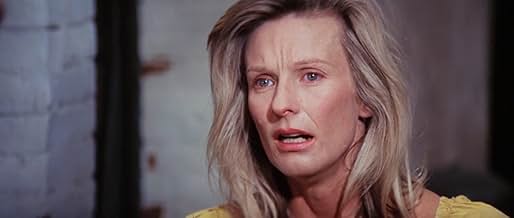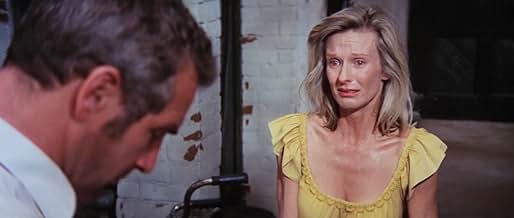IMDb RATING
5.5/10
1.4K
YOUR RATING
A radio station in the Deep South becomes the focal point of a right-wing conspiracy.A radio station in the Deep South becomes the focal point of a right-wing conspiracy.A radio station in the Deep South becomes the focal point of a right-wing conspiracy.
- Awards
- 2 nominations
Storyline
Did you know
- TriviaPaul Newman researched the role by spending time at radio station KMPC in Los Angeles. The teen intern assigned to show him the operation was Ken Levine, who became a disc jockey before going on to be a writer on M*A*S*H (1972), Cheers (1982) and Frasier (1993), and a producer and director of other TV shows.
- Quotes
Rheinhardt: I'm a survivor. Ain't that great?
- Alternate versionsThe preview version ran 3hrs and 10 minutes according to cast member Robert Quarry. Much of his character and several other characters' motivation and dramatic development scenes were cut out before release.
- ConnectionsReferenced in The Zodiac Killer (1971)
- SoundtracksGlory Road
Composed and Performed by Neil Diamond
Featured review
Whilst I would make it clear that I enjoyed much of this film, I would make it equally clear that I found a fair amount of it ill-developed and tediously clunky.
It is a ripe political melodrama, clearly borne out of passions and disappointments which arose from the particular year of 1968 and lingered long into the 1970s. I don't think I could make much argument with the previous commentator's view that the film is made from a certain left-liberal point of view. But a moderate left-liberal stance, and tacitly so. Despite saying that, Anthony Perkins' character - an embodiment in many ways of the "liberal" stereotype - is not made particularly sympathetic. Well-meaning, obsessive, anguished and humourless, I would agree with the Time Out reviewer that it was astute - if unimaginative - casting. Perkins comes across as if his Norman Bates persona has been relocated to late-sixties urban America and forcibly invested with a political conscience.
Paul Newman, who shares perhaps too few scenes with his nemesis Perkins, is also rather good, as the wanderer with a certain cocksure touch, who easily becomes an on-air "communicator" for this WUSA radio station - which is involved in fraudulent dealings and far-right preachings. Newman is every inch the tabloid professional; he is able to claim that he has no agenda and is 'just doing a job'. His political views are ambiguous; his final speech indeed suggesting he has no real belief in the "new right". It difficult to precisely gauge what makes the character tick, besides an vague cynicism; he is as flawed and formidable as Perkins, but diametrically opposite, with his rejection of abstract morality: his behaviour set on a course of mere self-aid. He proves to be the adept survivor, in contrast to genuine ideologues of left or right, but he has no moderation instinct, and turns out somewhat troubled, baffled even, at the film's appropriately frazzled conclusion.
Then there is Joanne Woodward; first film I have seen her in, and one of I gather, many, with Newman. Her character is a trifle ineffectual, present, as if a chess piece, to engage the elusive Reinhardt's desires for a period, and to provide a more 'ordinary' site of audience identification, who does not have right or left-wing politics, and does have more endearing traits: at least compared with Reinhardt. Woodward is quite memorable, cutting a wilting, waning figure as this unfortunate woman, herself much as transitory as Newman at the film's beginning. If she convinces as a 'realistic' character, it is albeit as one implicitly used to condemn the excesses of the New Right and the confrontational politics of the time. Her sickly teariness near the close, and the fact of her being the only person in the riotous hall to listen to Newman's absurdest "we're o.k.!" irony, suggests an idealised 'ordinary person' wrapped up in harmful political events. This is all rather undignified and melodramatic to stand for one who is expected to take this overwrought stuff seriously, and merely serves to draw out some of Reinhardt's humanity for the ending.
Newman does invest Reinhardt with a portion of his customary charm, but this is largely and effectively shown to be a front. Woodward is taken in, like the general audience as it were, by this superficial charm, and she ends up broken both by Newman's inconsistent, careless attitude and by the rupturing of the society depicted.
The film does not go far enough with many of its themes, and I did expect rather more in the dramatic and comic departments - if melodrama is going to work it needs either grand force or a bathetic line in absurdity. The whole lacks humour: born of a self-consciously 'serious' grounding in the subjectivity of U.S. politics in the late-sixties era. On this point, note that Laurence Harvey is vastly under-used; and he of that deeply substantial and bizarre masterpiece of a political thriller, "The Manchurian Candidate"... And additionally, we never see enough of Newman's dealings and relationships with his Rightist colleagues - similarly to how we never see Perkins in the broader context of Left politics. Loose ends were certainly left untied as regards Perkins' character.
I did on the whole quite enjoy this, but it was not a particularly entertaining film: variable in its plotting, dialogue and tone. A case of potential untapped? Undoubtedly. But it is worth paying close attention to those central performances, and it is at least part of its era's Hollywood; markedly less 'safe' and conformist then than now.
It is a ripe political melodrama, clearly borne out of passions and disappointments which arose from the particular year of 1968 and lingered long into the 1970s. I don't think I could make much argument with the previous commentator's view that the film is made from a certain left-liberal point of view. But a moderate left-liberal stance, and tacitly so. Despite saying that, Anthony Perkins' character - an embodiment in many ways of the "liberal" stereotype - is not made particularly sympathetic. Well-meaning, obsessive, anguished and humourless, I would agree with the Time Out reviewer that it was astute - if unimaginative - casting. Perkins comes across as if his Norman Bates persona has been relocated to late-sixties urban America and forcibly invested with a political conscience.
Paul Newman, who shares perhaps too few scenes with his nemesis Perkins, is also rather good, as the wanderer with a certain cocksure touch, who easily becomes an on-air "communicator" for this WUSA radio station - which is involved in fraudulent dealings and far-right preachings. Newman is every inch the tabloid professional; he is able to claim that he has no agenda and is 'just doing a job'. His political views are ambiguous; his final speech indeed suggesting he has no real belief in the "new right". It difficult to precisely gauge what makes the character tick, besides an vague cynicism; he is as flawed and formidable as Perkins, but diametrically opposite, with his rejection of abstract morality: his behaviour set on a course of mere self-aid. He proves to be the adept survivor, in contrast to genuine ideologues of left or right, but he has no moderation instinct, and turns out somewhat troubled, baffled even, at the film's appropriately frazzled conclusion.
Then there is Joanne Woodward; first film I have seen her in, and one of I gather, many, with Newman. Her character is a trifle ineffectual, present, as if a chess piece, to engage the elusive Reinhardt's desires for a period, and to provide a more 'ordinary' site of audience identification, who does not have right or left-wing politics, and does have more endearing traits: at least compared with Reinhardt. Woodward is quite memorable, cutting a wilting, waning figure as this unfortunate woman, herself much as transitory as Newman at the film's beginning. If she convinces as a 'realistic' character, it is albeit as one implicitly used to condemn the excesses of the New Right and the confrontational politics of the time. Her sickly teariness near the close, and the fact of her being the only person in the riotous hall to listen to Newman's absurdest "we're o.k.!" irony, suggests an idealised 'ordinary person' wrapped up in harmful political events. This is all rather undignified and melodramatic to stand for one who is expected to take this overwrought stuff seriously, and merely serves to draw out some of Reinhardt's humanity for the ending.
Newman does invest Reinhardt with a portion of his customary charm, but this is largely and effectively shown to be a front. Woodward is taken in, like the general audience as it were, by this superficial charm, and she ends up broken both by Newman's inconsistent, careless attitude and by the rupturing of the society depicted.
The film does not go far enough with many of its themes, and I did expect rather more in the dramatic and comic departments - if melodrama is going to work it needs either grand force or a bathetic line in absurdity. The whole lacks humour: born of a self-consciously 'serious' grounding in the subjectivity of U.S. politics in the late-sixties era. On this point, note that Laurence Harvey is vastly under-used; and he of that deeply substantial and bizarre masterpiece of a political thriller, "The Manchurian Candidate"... And additionally, we never see enough of Newman's dealings and relationships with his Rightist colleagues - similarly to how we never see Perkins in the broader context of Left politics. Loose ends were certainly left untied as regards Perkins' character.
I did on the whole quite enjoy this, but it was not a particularly entertaining film: variable in its plotting, dialogue and tone. A case of potential untapped? Undoubtedly. But it is worth paying close attention to those central performances, and it is at least part of its era's Hollywood; markedly less 'safe' and conformist then than now.
- HenryHextonEsq
- Apr 13, 2002
- Permalink
- How long is WUSA?Powered by Alexa
Details
Box office
- Budget
- $4,800,000 (estimated)
Contribute to this page
Suggest an edit or add missing content






































